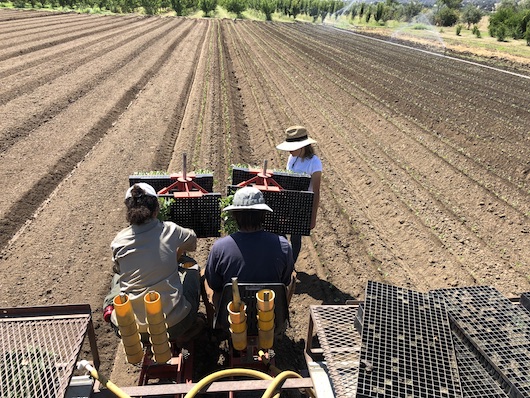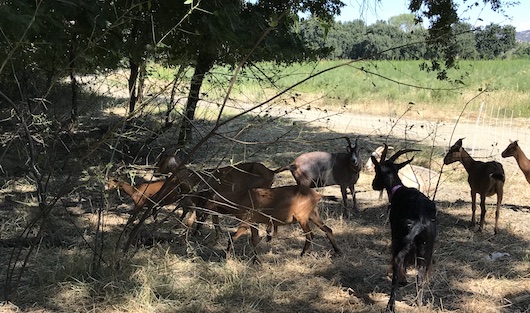
Our wonderful intern crew transplanting broccoli —
This column, News From the Farm, is a chronicle in the life of the Full Belly Farm organism, through the eyes of various writers who are ridiculously immersed in every aspect of farming and thus want to reflect upon the hidden underbellies, layers and intricacies that are part of the life of a farm. I want to state at the start that I understand that not everyone finds farming quite so fascinating, and only mention this because I have a fear that such might be the case with this week’s topic which touches upon farm liability insurance and the reasons why the Full Belly policy was abruptly cancelled. The reader has now been warned and may move on to other more scintillating topics, as he or she might wish.
I assume that there are some individuals in the audience that share my disposition in assuming that the insurance industry is likely to be basically rational. People like me would assume that underwriters assess risks based on quantitative records that they collect and then base their policies and premiums on costs that they have experienced historically. Of course, there are also probably skeptics in the audience who would remind us immediately that most of the world really isn’t all that rational and it is silly to expect it to be so.
The first posit from the insurance agents to the question, “Why did they cancel our policy?” was that the insurance companies are spooked by the wildfires that have ravaged the hills nearby in the last few years. Insurance companies are trying to shed coverage in any wildfire-prone locations, and it seems likely that they determined that Full Belly Farm was at risk of catastrophic loss to wildfire. One insurance agent confided that insurance companies go through 15-year cycles and we are in an ebb in the cycle during which they feel they need to “get rid of things that are problematic.” The same agent confided that “most insurance companies don’t know enough to have a meaningful conversation about it.”
But the letters that we received said nothing about wildfire. There were two notices. One of the notices said that “leafy greens are no longer eligible” for insurance. When I read this is when I started to get my knickers in a twist… Leafy greens (lettuce, spinach and bunched greens) constitute 5% to 7% of Full Belly’s produce revenue (depending on the year and how you do the calculation). Yes, we know that leafy greens are considered to be a risky commodity because when they are put into bags by the big produce handlers, given a shelf life of 17 days and sent hither and yon across the country, they tend to be one of the leading causes of food-related illnesses. But (and our agents do understand) this is a far cry from what we are doing at Full Belly, and our leafy greens are not to be considered a “commodity”. No bags that create the ideal conditions for buildup of pathogens, very little traveling, no mechanical harvest.
“Oh… but the real problem, is that you aren’t commingling your product!” was the answer. Apparently the underwriters have explained to the insurance agent, who was then kind enough to explain it to me, that when produce is commingled from different farms and different states, as it is when it is put into those bags of mixed lettuce and spinach, if there was a food safety problem, no one would ever know which farm it came from, so the insurance companies would have less direct risk! But in the case of Full Belly Farm, foolishly selling direct to stores and consumers, with a short and very transparent chain of delivery, if there was a food safety problem it would be obvious that it was Full Belly that was at fault, thus the insurance companies are exposed to greater risk. I guess the lesson here is that we aren’t talking about the greatest safety for humans, but actually the lowest risk for insurance underwriters. The skeptics in the audience may be getting the upper hand in this discussion…
I mentioned above that there were two notices. The other reason given on the cancellation notice was, “the increased agritainment exposure.” What a lovely word that is, “agritainment”. It turns out that the way to think about what it means, is to substitute the word “agri-tourism” or the “presence of farm visitors”. Most farm insurance underwriters do not expect to have any “public exposure” on a farm — the public isn’t actually expected to know, see or care about farming. But at Full Belly there are tours, children’s visits, farm dinners, pizza nights and even this big Hoes Down Harvest Festival in October. Rather than assuming that this just keeps us honest and careful in our farming practices, the underwriters are saying that Full Belly Farm doesn’t look like other farms and is thus a greater risk.
As the conversation continued between me and the insurance agents, other concerns popped up. For example, our CSA boxes are delivered to pick-up sites rather than one by one delivered to people’s homes. Clearly the lack of control over those pick-up-sites represents greater risk. Also, we sell meat, we sell eggs – where is it all going to end? Basically the professionals who think about risk and know about risk, are trying to tell us that something bad is likely to happen, based on their mis-impressions of our business.
Well, obviously I hope that they are wrong. I’m not sure if they are going to succeed in making me more conservative (avoiding risky activities), more skeptical (convinced that the corporate frame of reference is so far gone that no amount of facts and figures will make a difference) or simply very irritated (don’t they know I have more important things to do?) I’m quite sure that Full Belly Farm will find a new underwriter, so I don’t want the kind audience of this column to feel any alarm at our expense. We’re just passing on the story of a day in the life of a farm.
—Judith Redmond

Our herd of goats has done a fantastic job of clearing the brush in the swath of forested land below Andrew’s house. On Saturday Anna saw a full grown Mountain Lion just below her patio that overlooks this field. Luckily the Lion wasn’t after the goats.
